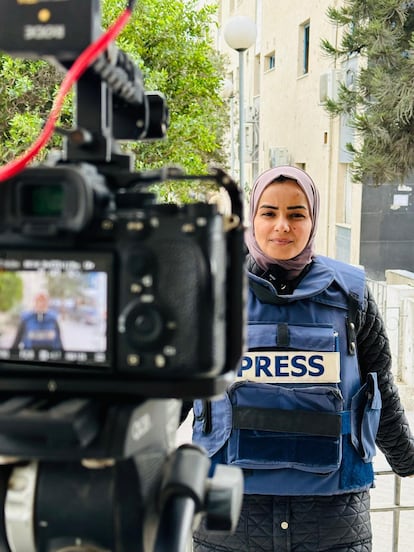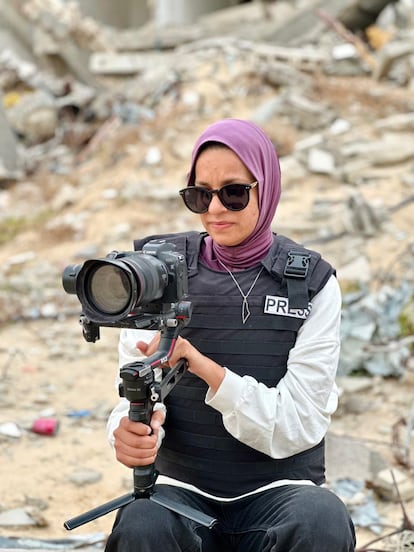Women and reporters in Gaza: "Men don't suffer the same pressure as us."

Every day, when Dina Rajab leaves her three children to go and broadcast live for the Iraqi television station where she works, she feels the same anguish in her stomach. “Will I see them again? Will something happen to me while I'm working ? Am I a target of Israel just for being a journalist?” asks this Gazan reporter, who gave birth to her third child in a tent a few months ago.
Rajab never accepts assignments that involve spending a night away from them or leaving them in the care of strangers. But at the same time, she's always ready to go live if there's any breaking news and skips sleep to deliver a report on time for fear that her bosses might think that being a woman and a mother hinders her work.
“Do you think a male journalist experiences all this in the same way?” “No, men don’t experience the same pressure as we do,” she replies, laughing, from Gaza City.
That resounding no is echoed by all the Gazan journalists featured in this report, who risk their lives every day, just like their male colleagues, and also suffer from some additional difficulties due to being women, starting with a lack of visibility. "How many Palestinian journalists are known outside of this country?" they ask, knowing the answer.
Added to this is the lack of access to information in certain reports, wage discrimination, and a complete lack of privacy in their daily lives that has made them consider leaving the profession at times. “We also feel a kind of family pressure that restricts our movements. Our loved ones worry more about us, because that's the way it is culturally here. And sometimes I decide to stay home to protect my family,” Rajab admits.
In more than 22 months of war, more than 200 journalists have lost their lives violently, according to Reporters Without Borders (RSF) estimates. The latest was this week in Gaza City, when Israel bombed the tent housing the Qatari television team Al Jazeera, including one of its most prominent reporters, Anas al Sharif, who had been directly targeted by military officials. Seven people died in the attack.
According to estimates by the Palestinian Journalists Syndicate, some 30 women journalists have been killed in Israeli attacks in Gaza since October 2023. Among them is Fatima Hassouna, a photojournalist who lost her life in a bombing raid in April. The newspaper published her photo diary posthumously last month.
We feel a kind of family pressure on us that restricts our movements. Our loved ones worry more about us, because culturally that's how it is here.
Dina Rajab, journalist
From the Al Shati refugee camp in northern Gaza, Shoroq Shaheen, 32, a journalist for Syrian TV, admits that female reporters in Gaza suffer greatly from their families when they go out to work. “Because we still maintain those traditional roles and obligations in our society, as mothers, sisters, daughters…” says the reporter, who has lived in a tent with other colleagues for weeks to feel safer and less alone.
The journalists interviewed for this report agree that they do most of the housework before going to work, and when they become mothers, they feel a sense of guilt that prevents them from finding fulfillment in their work. "I know that today, the one who gives my children security in the face of fear, hunger, or the sound of bombs is me," says Islam Zanoun, a journalist for Palestinian Authority Radio and Television.

Shaheen, who is single, believes there are media outlets that believe men have "much more flexibility" than women in working and moving within conflict zones. "Even though we're providing evidence to the contrary," she emphasizes.
“I work hard, like my male colleagues. I cover the same stories they do: destruction, displacement, injuries, deaths … I've lived in tents like them, even though it means completely losing our privacy,” she adds.
“Especially when we have our period, we have to spend the whole day outside, without a bathroom and running around constantly covering the news,” confirms Baraa Lafi, who is Palestinian but grew up in Sweden and has only been in Gaza for a few years.
This is her first war, covering it for Swedish radio and other media outlets from Khan Yunis, where she shares a tent with seven other female journalists. "We're like a family now," says the 28-year-old reporter.

After nearly two years of nonstop work, Shaheen confesses that she's physically and mentally at her limit. "I've wanted to cry many times, but I haven't been able to because I haven't found a place to do so," she says.
After suffering six displacements and spending months without seeing his family, he has returned to live with his parents and goes to Gaza City every day to work. "But first, I prepare breakfast, and when I come back, I wash dishes," he explains. To get to the location from which he must broadcast his broadcasts, Shaheen walks an average of four kilometers, takes donkey carts, and if he's lucky, a car.
"I think men have more job opportunities than we do, especially in these dangerous environments. I've also heard that women are paid less," she adds.
A new female narrativeI have wanted to cry many times, but I have not been able to because I have not found a place to do it.
Shoroq Shaheen, journalist
Islam Zanoun, a journalist for Palestinian television, shares her point of view. “I think there are media outlets that prefer to work with men because they think we women won't be able to dedicate ourselves fully to the work. And if they hire a journalist, they want her to be single, and I've sometimes felt that they prefer her not to wear a veil,” she adds.
“I've lost job opportunities because of all this. I've often felt that the selection processes didn't take into account my professional merits,” laments this mother of three, who lost her home, has been displaced several times, and currently lives in Gaza City.
I think there are media outlets that prefer to work with men because they think we women won't be able to dedicate ourselves body and soul to the job. And if they hire a woman, they want her to be single.
Islam Zanoun, journalist
But these reporters also admit that this female presence is fostering a new narrative. “We feel and reflect this misfortune differently in our stories,” they agree. “For example, it's harder for us to access some sources or places, but at the same time we can also report on things they can't, especially those that involve other women,” Rajab believes.
Zanoun and other journalists also lament their precarious conditions. In this television reporter's case, none of the media outlets she works for sent her a bulletproof vest, which she finally obtained thanks to her brother, nor did she receive any training to work in such difficult conditions. The fixed salary she receives from the Palestinian Authority, since she works for public television, is small and arrives late "due to the economic crisis." She also collaborates with another Moroccan network, with which she has no fixed salary.
From Deir el Balah, in the center of the Strip, Noor Swirki, a journalist for Saudi television's Al Sharq, celebrates the increasing number of female journalists, but emphasizes that most of them write or appear on camera and have not yet managed to break into areas of the profession that remain reserved for men.
For example, in Gaza, there are hardly any female photojournalists or camerawomen. With a few exceptions, such as Samar Abu Elouf, who won the prestigious World Press Award with a photo of a mutilated child.
Swirki admits that “it's not easy being on the ground” as a woman and a mother. The journalist and her husband, who is also a reporter, decided to take their two children out of Gaza when the war began and people could still leave through the Rafah border crossing, if they had dual nationality or some kind of safe passage. “But now I'm consumed by anxiety, because I don't know if I'll be able to hug them again, because I don't know if I'll survive,” she says.
EL PAÍS





